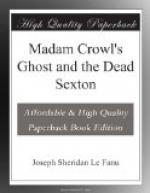“‘By Jen!’ says my aunt, as puttin’ the poker in his hand, she keeked by his shouther, and sid the ill-favoured thing, ’hae a care, sir, what ye’re doin’. Back wi’ ye, and shut to the door!’
“But in place o’ that he steps in saftly, wi’ the poker pointed like a swoord, and he gies it a poke, and down it a’ tumbles together, head and a’, in a heap o’ bayans and dust, little meyar an’ a hatful.
“‘Twas the bayans o’ a child; a’ the rest went to dust at a touch. They said nout for a while, but he turns round the skull, as it lay on the floor.
“Young as I was, I consayted I knew well enough what they was thinkin’ on.
“‘A dead cat!’ says he, pushin’ back and blowin’ out the can’le, and shuttin’ to the door. ’We’ll come back, you and me, Mrs. Shutters, and look on the shelves by-and-bye. I’ve other matters first to speak to ye about; and this little girl’s goin’ hame, ye say. She has her wages, and I mun mak’ her a present,’ says he, pattin’ my shouther wi’ his hand.
“And he did gimma a goud pound and I went aff to Lexhoe about an hour after, and sa hame by the stage-coach, and fain was I to be at hame again; and I never sid Dame Crowl o’ Applewale, God be thanked, either in appearance or in dream, at-efter. But when I was grown to be a woman, my aunt spent a day and night wi’ me at Littleham, and she telt me there was no doubt it was the poor little boy that was missing sa lang sen, that was shut up to die thar in the dark by that wicked beldame, whar his skirls, or his prayers, or his thumpin’ cud na be heard, and his hat was left by the water’s edge, whoever did it, to mak’ belief he was drowned. The clothes, at the first touch, a’ ran into a snuff o’ dust in the cell whar the bayans was found. But there was a handful o’ jet buttons, and a knife with a green heft, together wi’ a couple o’ pennies the poor little fella had in his pocket, I suppose, when he was decoyed in thar, and sid his last o’ the light. And there was, amang the squire’s papers, a copy o’ the notice that was prented after he was lost, when the ald squire thought he might ’a run away, or bin took by gipsies, and it said he had a green-hefted knife wi’ him, and that his buttons were o’ cut jet. Sa that is a’ I hev to say consarnin’ ald Dame Crowl, o’ Applewale House.”
THE DEAD SEXTON
The sunsets were red, the nights were long, and the weather pleasantly frosty; and Christmas, the glorious herald of the New Year, was at hand, when an event—still recounted by winter firesides, with a horror made delightful by the mellowing influence of years—occurred in the beautiful little town of Golden Friars, and signalized, as the scene of its catastrophe, the old inn known throughout a wide region of the Northumbrian counties as the George and Dragon.
Toby Crooke, the sexton, was lying dead in the old coach-house in the inn yard. The body had been discovered, only half an hour before this story begins, under strange circumstances, and in a place where it might have lain the better part of a week undisturbed; and a dreadful suspicion astounded the village of Golden Friars.




